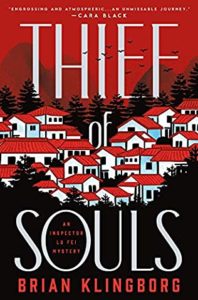Brian Klingborg’s new series features Inspector Lu Fei, and is set in northern China. Lu is a great new character and Klingborg’s book is a fast paced, intelligent police procedural with an interesting setting. It’s a terrific start to a new series. You can read my review of Thief of Souls here.

Q: First of all, I kept flipping to your author info as I couldn’t believe you weren’t Chinese. How do you come by your extensive knowledge of China?
A: I majored in East Asian Studies as an undergraduate, spent a year abroad in Taiwan, then attended grad school where I studied cultural anthropology with a China focus. After school I returned to Taiwan where I lived and worked for several more years. Since then, I have continued my sporadic exploration of Chinese culture, history and language. And in the process of writing Thief of Souls, I did lots and lots of additional research.
Q: How did you choose Harbin? I know it’s a large city but maybe not so well known in the west. Were you going for climate?
A: Most books in English that feature a Chinese setting take place in Beijing or Shanghai. I wanted to do something different. Given its past as a Russian base for the Trans-Siberian Railway and home to a large Jewish community, Harbin features a uniquely international heritage. Also, I knew I wanted my protagonist to be stationed in a small town, but to have a big-city cop pedigree. Harbin seemed to fit my requirements, appeared ripe with future story possibilities, and additionally had the advantage of being a fresh location to a Western audience.
Q: I thought the action scenes were really well done, which is not always the case. I read so many mysteries and those scenes are often clunky or just plain silly, but I loved Lu’s knowledge of martial arts and how it made the fight scenes actually interesting. Can you talk about that a little bit?
 A: Thanks! I have background in the martial arts, so I was able to incorporate some of that into the fight scenes. Unlike, say, a John Wick movie, Thief of Souls is a fictionalized version of the real world – the plot, characters and situations are exaggerated for effect, but they all exist within the realm of possibility. I’ve followed the same concept for my fight scenes. You won’t find Lu Fei executing any delayed death touch techniques or kung fu moves that defy physics.
A: Thanks! I have background in the martial arts, so I was able to incorporate some of that into the fight scenes. Unlike, say, a John Wick movie, Thief of Souls is a fictionalized version of the real world – the plot, characters and situations are exaggerated for effect, but they all exist within the realm of possibility. I’ve followed the same concept for my fight scenes. You won’t find Lu Fei executing any delayed death touch techniques or kung fu moves that defy physics.
Q: Are you going to include his fellow officers more in future books or is Lu more of a lone wolf? In so many police novels a strength is a yin and yang between the partners. Is that something you’re considering? I thought all of the officers had interesting possibilities.
A: I will certainly return to some of these characters and explore more of their stories in future books.
Q: Do have a long series in mind? This really feels like the start of one.
A: I hope so! There are plenty of adventures left in store for Lu Fei.
Q: I liked that Lu went back and forth the between the city and the country in his investigation. He’s in an awfully small town, so I’m thinking that might be something you carry forward in future books?
A: In the sequel to Thief of Souls, I have Lu Fei traveling to Myanmar (I started the sequel before the current coup and chaos and that has resulted in some emergency rewriting!). In future books, he might travel to other provinces, or even abroad, but he will always return to Raven Valley Township– at least, as long as his love interest, Luo Yanyan, chooses to remain there.
Q: I was fascinated by the different layers of officialdom that Lu has to deal with. It added a lot to the book. How much research on the layers of contemporary Chinese government did you have to do? How do you know that what you’re putting on the page is authentic?
A: Frankly, as an undergraduate, I found the classes on governance in modern China to be a bit of a snooze. But to tell a story that featured a murder investigation in a realistic way, I had to go back and bone up on PRC politics. While I simplified a bit, the basic outline I present in Thief of Souls is an accurate representation of how local government operates. As you can see, the CCP (Chinese Communist Party) really rules the roost and getting important stuff done involves swimming through oceans of red tape – or having guanxi (political and social connections).
Q: What comes first for you? Story? Character? Setting?
A: It depends, but in this case, it was the character of Lu Fei. I had originally intended to write a mystery series set in yet another fascinating country I’ve traveled to quite a bit – Vietnam. The concept was to follow a Vietnamese police inspector as he juggles corrupt cops, criminals, the CIA, US military, Chinese gangs, politicians and Vietcong in Saigon from about 1968 until 1975. In the process of researching the history and politics of that period, I had an epiphany. Why not write leverage my past studies and existing language skills to write about a cop in China? My goal was to create a protagonist who was likable and relatable, but also an accurate reflection of a culture and way of thinking that is not my own. Hopefully, I have done right by Lu Fei.
Q: What makes you excited to sit down and write every day?
A: As the old saying goes, “I dislike the act of writing, but like having written.” I find writing a difficult and frustrating process, but I like telling stories and I think I have a few worth sharing. When I manage to get one down on paper in a half-way decent manner, there is an enormous feeling of accomplishment at having created something tangible from the ether – fog? — of my imagination.
Q: What book was transformational for you – what book influenced you in your path as a reader/writer?
A: To be honest, the books I’ve found most transformational were the badly written ones — because they made me think, “Hey, I can do that!” In terms of positive role models, I’m a bit embarrassed to say as it may seem politically incorrect nowadays, but James Clavell’s Asian Saga series undoubtedly made a big impression on me and I enjoyed its seamless blend of history, cultural detail and drama. For the same reason, and because of their saucy irreverence, I am a fan of George MacDonald Fraser’s Flashman books. A novel that I return to again and again to marvel at its eloquent simplicity is Cormac McCarthy’s No Country For Old Men.
Q: What writers were/are influential?
A: I admire and try to emulate writers who write simply and expressively as opposed to being conspicuously “literary.” Elmore Leonard had a great quote: “Never use a word other than said to carry dialogue.” A man after my own heart. Cormac McCarthy is another writer who can communicate an entire universe in a few simple words – unless you’re talking about Blood Meridian. Going back a few years, Ian Fleming knew how to spin an entertaining tale of exotic intrigue.
Q: And finally – what’s next? Another Inspector Lu book? (I hope!)
A: Yes, I’m putting the finishing touches of book number two in the series now and hope it will be published around May 2022!
*************
BRIAN KLINGBORG has both a B.A. (University of California, Davis) and an M.A. (Harvard) in East Asian Studies and spent years living and working in Asia. He currently works in early childhood educational publishing and lives in New York City. Klingborg is also the author of Kill Devil Falls.